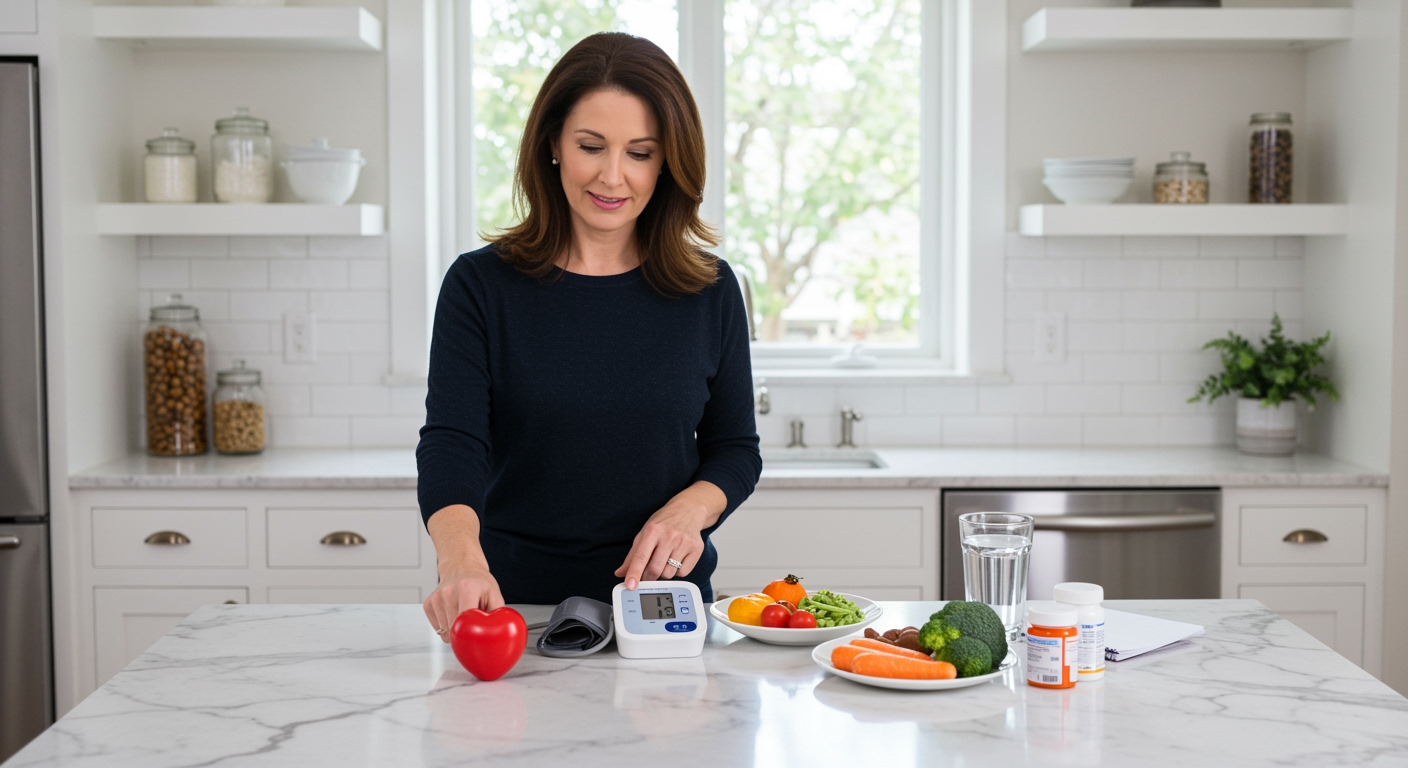✪ Key Takeaway: Meal timing significantly affects blood pressure by influencing circadian rhythms and metabolic processes.
Introduction
Your blood pressure spikes at 3 PM every day, and you have no idea why.
You might be wondering if the timing of your meals has anything to do with those mysterious blood pressure fluctuations throughout the day.
Hi, I’m Abdur, your nutrition coach and today I’m going to explain how meal timing directly impacts your blood pressure control and what you can do about it.
How Does Your Body Clock Control Blood Pressure?
Your body operates on a 24-hour internal clock called the circadian rhythm.
This biological clock controls when your blood pressure naturally rises and falls throughout the day.
During normal circumstances, your blood pressure follows a predictable pattern.
It stays lowest during sleep, begins rising in the early morning hours, and peaks during late afternoon.
When you eat at irregular times, you disrupt this natural rhythm.
Your body releases stress hormones like cortisol and adrenaline when meal timing becomes unpredictable.
These hormones cause your blood vessels to constrict and your heart to pump harder, leading to elevated blood pressure readings.
✪ Fact: Your blood pressure naturally varies by 10-20 mmHg throughout the day due to circadian rhythms.
What Happens When You Skip Meals?
Skipping meals triggers your body’s survival mode.
Your blood sugar drops rapidly, causing your adrenal glands to release stress hormones.
These hormones signal your liver to release stored glucose into your bloodstream.
This process causes your blood vessels to constrict temporarily, raising your blood pressure.
When you finally eat after skipping a meal, your body overcompensates.
You tend to eat larger portions, which causes a rapid spike in blood sugar and insulin levels.
High insulin levels promote sodium retention in your kidneys, leading to increased blood volume and higher blood pressure.
✪ Pro Tip: Eat within one hour of waking up to prevent morning blood pressure spikes.
Does Late Night Eating Raise Blood Pressure?
Eating late at night disrupts your body’s natural nighttime recovery process.
Your digestive system should be resting during sleep hours, not processing food.
When you eat close to bedtime, your body diverts blood flow to your digestive organs.
This increased metabolic activity prevents your blood pressure from dropping to its normal nighttime levels.
Late night eating also interferes with melatonin production, a hormone that helps regulate blood pressure during sleep.
Research shows that people who eat within three hours of bedtime have higher average blood pressure readings throughout the night.
This pattern prevents your cardiovascular system from getting the rest it needs to maintain healthy blood pressure levels.
✪ Note: Stop eating at least three hours before bedtime to allow proper nighttime blood pressure dipping.
Can Regular Meal Times Lower Blood Pressure?
Eating at consistent times every day helps stabilize your blood pressure patterns.
Your body learns to anticipate meals and prepares digestive enzymes and hormones accordingly.
This predictable pattern reduces the stress response that causes blood pressure spikes.
Regular meal timing also helps maintain steady blood sugar levels throughout the day.
When your blood sugar remains stable, your body produces less insulin and stress hormones.
Studies show that people who eat at the same times daily have lower average blood pressure readings compared to irregular eaters.
The key is spacing your meals evenly throughout the day, typically every 4-6 hours.
✪ Pro Tip: Set meal alarms on your phone to maintain consistent eating times until it becomes automatic.
What Is The Best Meal Schedule For Blood Pressure?
The optimal meal schedule for blood pressure control follows your body’s natural circadian rhythm.
Eat your largest meal during mid-morning to early afternoon when your metabolism is most active.
Your body processes nutrients most efficiently between 10 AM and 2 PM.
Start with a moderate breakfast within one hour of waking up to prevent morning blood pressure surges.
Have your main meal around noon when your digestive fire is strongest and insulin sensitivity is highest.
End with a light dinner at least three hours before bedtime to allow proper nighttime blood pressure dipping.
This eating pattern supports your body’s natural rhythm and helps maintain stable blood pressure throughout the day.
✪ Fact: Eating your largest meal at lunch instead of dinner can reduce nighttime blood pressure by 5-10 mmHg.
The Bottom Line
Meal timing plays a crucial role in blood pressure control by influencing your circadian rhythms and metabolic processes.
Your body clock needs predictable fuel delivery to maintain healthy blood pressure patterns.
I would love to hear about your experiences with meal timing and blood pressure in the comments below – share your questions or let me know what strategies have worked best for you.
At NutritionCrown, we use quality and credible sources to ensure our content is accurate and trustworthy. Below are the sources referenced in creating this article:
- American Heart Association: Inconsistent mealtimes linked to heart risks
- PMC: Circadian rhythms and metabolic health
- Wiley Online Library: Meal timing and cardiovascular health





